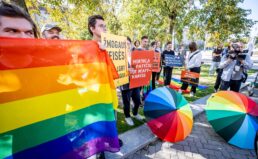Lithuania has been ranked 36th out of 49 countries in ILGA-Europe’s 2025 Rainbow Map, scoring only 24% in the organisation’s assessment of LGBTI legal and policy environments across Europe. The result reflects minimal progress and continuing systemic gaps in protections for LGBTI people in the country, placing Lithuania alongside Italy and below Latvia and Slovakia.
This year’s Rainbow Map arrives at a time of growing concern over the erosion of democratic norms and targeted attacks on LGBTI rights across the continent.
Lithuania: Too Few Protections, Implementation Gaps
While Lithuania avoided the dramatic backsliding seen in some countries, its low score underscores a longstanding failure to adopt comprehensive protections for LGBTI people. According to ILGA-Europe’s national review, key legal frameworks remain absent or poorly enforced:
- There is no legal recognition of same-sex partnerships or families.
- Hate crime policies addressing sexual orientation and gender identity exist in theory but remain poorly implemented, particularly regarding the General Prosecutor’s recommendations.
- Legal gender recognition remains difficult, and while court judgments offer limited recourse, a self-determination model is still lacking.
- While Lithuania’s Constitutional Court overturned the “anti-LGBTI propaganda” law in 2024—a notable legal victory—practical changes in education, civil society freedom, and public discourse remain fragile and inconsistent.
Gains and Losses Across Europe
In contrast to Lithuania’s stagnation, Latvia rose four places thanks to a new civil union law, becoming the second Baltic state to extend legal recognition to same-sex couples. Poland, long viewed as regressive on LGBTI rights, moved up three places by dismantling “LGBT-free zones” and reducing restrictions on public events.
However, democratic backsliding and rising far-right influence have catalysed regression elsewhere. Hungary criminalised Pride events and removed gender identity protections from its equal treatment law, dropping to 37th place. In Georgia, new laws ban nearly all forms of LGBTI representation, echoing Russia’s authoritarian model and eroding basic freedoms.
Strategic Litigation and Civil Society Resilience
Despite the bleak trends, civil society across Europe continues to push back, often through the courts. In Lithuania, the Constitutional Court’s invalidation of the anti-LGBTI law marked a crucial legal win. Similar strategic litigation efforts are underway across the region—from rainbow families in Croatia challenging adoption barriers, to Czechia’s Constitutional Court ruling against sterilisation for legal gender recognition.
These victories highlight the importance of an independent judiciary and strong civil society in defending human rights, especially when political will is absent or hostile.
Conclusion: The Need for Action in Lithuania
Lithuania’s standing on the Rainbow Map demonstrates a failure to advance basic protections, not just compared to Western Europe, but increasingly also in relation to regional peers. While the Constitutional Court’s rulings signal potential for progress, reform remains slow and incomplete, and hate crimes continue to be underreported and poorly addressed.
As the broader European trend shows, LGBTI rights are increasingly under threat in the context of authoritarianism, nationalism, and attacks on fundamental freedoms. Lithuania must not only safeguard recent legal gains but must also urgently enact comprehensive legislation to protect and affirm LGBTI lives—from legal gender recognition to inclusive education and family rights.
“This year’s ranking is a stark reminder that symbolic victories are not enough,” said Vladimir Simonko, Executive Director of LGL. “Without a clear political commitment to meaningful legislative reform and the full enforcement of anti-discrimination protections, Lithuania will continue to fall behind—even compared to its closest neighbours. Our community deserves more than just rhetoric—we deserve real equality. We will be raising awareness of these issues during Baltic Pride week in Vilnius, 2–7 June 2025.”




